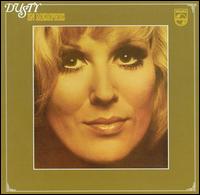Dusty in Memphis
| Dusty in Memphis | ||||
|---|---|---|---|---|
 |
||||
| Studio album by Dusty Springfield | ||||
| Released | 31 March 1969 | |||
| Recorded | September 1968 | |||
| Studio | American Sound Studios in Memphis; Dusty Springfield's final vocals recorded in New York | |||
| Genre | Pop, soul, R&B, blue-eyed soul | |||
| Length | 33:31 | |||
| Label | Atlantic | |||
| Producer | Jerry Wexler, Arif Mardin, Tom Dowd | |||
| Dusty Springfield chronology | ||||
|
||||
| Alternative cover | ||||

UK edition
|
||||
| Professional ratings | |
|---|---|
| Retrospective reviews | |
| Review scores | |
| Source | Rating |
| AllMusic | |
| Encyclopedia of Popular Music | |
| Entertainment Weekly | A |
| Music Story | |
| MusicHound Rock | 4/5 |
| Q | |
| Rolling Stone | |
| The Rolling Stone Album Guide | |
| Sputnikmusic | 4.5/5 |
Dusty in Memphis is the fifth studio album by English singer Dusty Springfield. She recorded the album at American Sound Studio in Memphis with a team of musicians and producers that included Jerry Wexler, Arif Mardin, Tom Dowd, conductor Gene Orloff, backing vocalists The Sweet Inspirations, bassist Tommy Cogbill, and guitarist Reggie Young. It featured one of her top-10 UK hits, "Son of a Preacher Man". Although Dusty in Memphis sold poorly when it was first released by Atlantic Records in 1969, the album has since been acclaimed by critics as one of the greatest records of all-time and Springfield's best work.
Hoping to reinvigorate her career and boost her credibility, Dusty Springfield turned to the roots of soul music. She signed with Atlantic Records, home label of one of her soul music idols, Aretha Franklin. Although she had sung R&B songs before, she had never released an entire album solely of R&B songs. She began recording an album in Memphis, Tennessee, where some notable blues musicians had grown up. The Memphis sessions at the American Sound Studios were recorded by the A team of Atlantic Records. It included producers Jerry Wexler, Tom Dowd and Arif Mardin, the back-up singers Sweet Inspirations and the instrumental band Memphis Cats, led by guitarist Reggie Young and bassist Tommy Cogbill. The Memphis Cats had previously backed Wilson Pickett, King Curtis and Elvis Presley. Terry Manning (also a recording engineer, but in this case) a writer for the New Musical Express attended the recording sessions, and ended up assisting Tom Dowd. The songs were written by, among others, Gerry Goffin & Carole King, Barry Mann & Cynthia Weil, Michel Legrand, Randy Newman, and Burt Bacharach & Hal David.
...
Wikipedia
